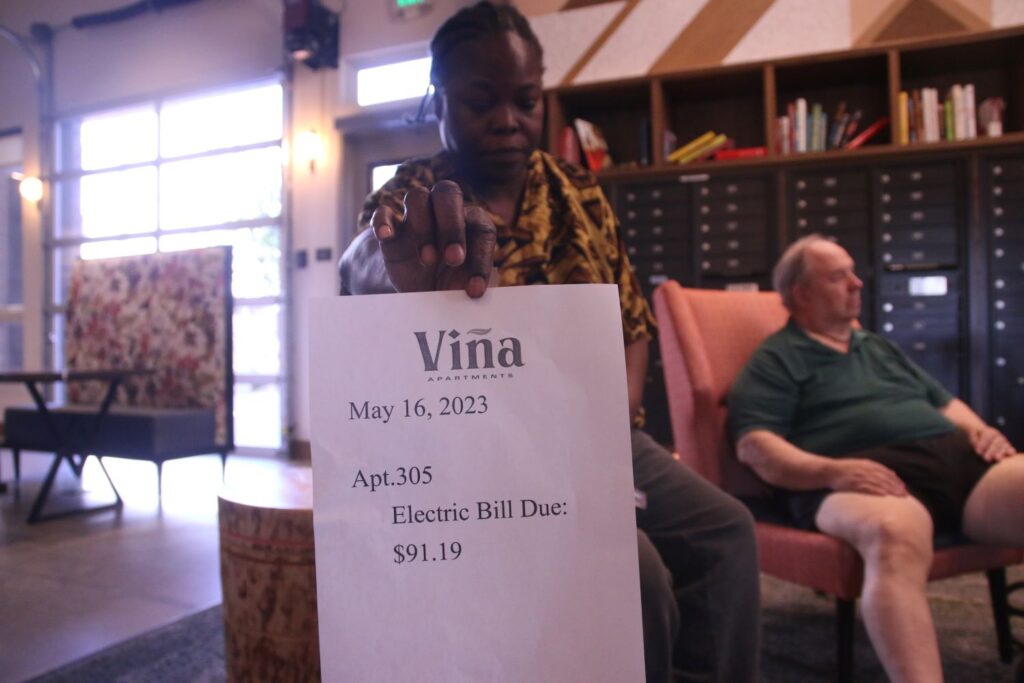By Eric Heinz
Residents at the Viña Apartments have formed a tenants union in response to as much as 12% rent increases and what they claim are shortcomings from the company that manages the building.
Recently, residents presented managers of the Elyria-based apartment complex, which is reserved for low-income individuals, with a letter of their formation of the union. The union is part of a larger umbrella organization, the Denver Aurora Tenants Union (DATU).
“What our hope is with the tenants union is we come together and get some things done,” said Melissa Diaz, who helped formalize the union. “We could all live in safety and feel good about where we live and, you know, feel proud about it again.”
Complaints from residents ranged from allegations of inadequate security at the apartment complex to poor maintenance and other issues. Many residents have also reported being charged late fees despite paying rent on time, as well as other unexplained or incorrect fees coming from management.
“Soon after Syringa Property Management was hired as Viña’s property management company, the resident portal where tenants paid rents and viewed their payment ledger was taken down,” the tenants union letter stated. “This has led to several tenants being charged twice for rent by Syringa Property Management, with the claim that they have not received rental payments from these tenants despite the tenants providing evidence of payment and requesting access to their payment ledger via the previous resident portal.”

Bruno Tapia, a founding member of the DATU, said during a recent meeting with the tenants that the more support the union can get, the stronger it can become.
“We have ongoing conversations that we’re starting with other people in the community, like the ones that are members of the community benefits agreement,” Tapia said. “Luckily, we’ve got Tepeyac Community Health Center and the Center for Community Wealth Building, and we want to get them involved in also advocating on your behalf to the management so that they see this pressure coming from the community.”
Syringa had only been the management company for 45 days when it responded to the tenants’ complaints.
“We value our residents and want to understand each concern and respond in a timely manner,” a letter obtained by The G.E.S. Gazette from Syringa to residents stated. “We will also communicate directly with our residents through our own channels.” Jessica Neckien, a resident, provided The G.E.S. Gazette with a copy of her May utility bill that was posted to her door, not in an envelope, and it did not include service times, kilowatt hours nor an energy source report — it just said, “Electric Bill Due: $30.49.”
Dillon Baynes, a co-founder and managing partner with Columbia Ventures, recently told other media outlets that there had been a $300,000 shortfall in rent payments, but they are remedying that issue.
“A solution to reinstate online payments has been identified, through the use of a new property management software,” Baynes said. “Syringa started staff training on the new platform and plans a transition to the new software in June.”
Columbia and Syringa held meetings with about 25 residents recently to confront concerns as a group and individually, which included addressing problems with rent payments and any “misconceptions,” Baynes said.
Baynes said Columbia has also supplemented the maintenance crew with two temporary team members to catch up on any outstanding work and they expect wait times to be shortened, as additional site staff will be coming within a few weeks. He said a contractor has been hired to conduct “miscellaneous work” around the building, including additional light and cameras for the parking lot and cameras in stairwells to address security concerns.
Baynes also said the May electrical bills are being reissued to include usage and other details.
According to the Department of Housing and Urban Development (HUD), rents were increased at income-restricted living facilities by an average of 10%.
Derek Woodbury, a spokesman for Denver’s Department of Housing and Stability, told The G.E.S. Gazette that the city experienced a “significant increase” in its area median income last year, which was a jump of nearly 12%. Therefore, Columbia Ventures is within its right to raise the rents to 12%, albeit that can be strenuous for people living on a fixed income.
“This increase has had an impact on rental costs across the city, including both income-restricted units and market-rate apartments,” Woodbury said. “The rent costs at Viña do not exceed the maximum allowable rent cost, as published by HUD and (Colorado Housing Finance Authority).”
Woodbury also said the rent costs do not exceed Denver’s maximum allowable monthly charge under Denver’s Expanding Housing Affordability Ordinance, which took effect in 2022, although the Viña units were built prior to the deadlines for that ordinance.
Initially, residents of the union threatened to take some sort of legal action by the end of May if their demands were not addressed. Rebecca Cohn, head of Community Economic Defense Project, or CED Law, which works with the DATU, said forming a tenants union could make it easier for the residents to obtain legal representation.
“The whole group of them can feel stronger than just one tenant acting on their own,” Cohn said. “By working together, they can have a stronger advantage in collective bargaining power. So it’s going to be more advantageous for them to negotiate for things, especially when they issue a demand letter like they did.”
CED is not representing any of the tenants at the Viña apartments at this time, Cohn said, but the law firm did meet with residents recently to explain what rights they have going forward.

Be the first to comment